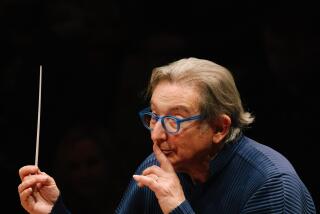Obituary : William Schuman; Famed U. S. Composer, Educator
- Share via
William Schuman, composer, educator, administrator and founding president of Lincoln Center, has died in New York City.
Spokesmen for his family said the former president of the Juilliard School and a musical craftsman who melded folk music and jazz into a series of compositions that won him two Pulitzer Prizes was 81.
He died Saturday at Lenox Hill Hospital after hip surgery.
With Leonard Bernstein, Schuman was considered the “baby” of the talented handful of modern American composers that once included Aaron Copland, Virgil Thomson and Roy Harris.
On the eve of his 80th birthday, he told the Washington Post that “I cannot believe that I am not still the youngest American composer as I was for years.”
Encouraged primarily by Copland, who was 10 years his senior, Schuman was a prolific yet meticulous composer who made himself work at his music at least 600 hours a year. He kept track of that time with a diary of each day. At his death his hundreds of works included 10 symphonies, five ballet scores; violin, viola and cello concertos, four string quartets, band scores, operas and numerous works for chorus.
And his approach to composition did not change radically over his 60-year career.
“My music can always be sung. And I have never written a note in my life that was not deeply felt.”
Schuman was celebrated for the “new romanticism” that permeated his music, a return to tonality after decades of dissonance from 20th-Century composers.
Born in Manhattan, William Howard Schuman (the name was modified by his businessman father from Schuhmann), attended public schools and formed a jazz ensemble in high school, where he played violin and banjo. He entered the School of Commerce at New York University. After hearing a symphony concert, he decided to study music seriously although he continued to play jazz and pursued a passion even greater than music--playground baseball. One of his better-known pieces is a cantata version of the baseball opera “Casey at the Bat.”
“Baseball was my youth,” he told an interviewer when he took over the unfinished Lincoln Center project in 1962. “Had I been a better catcher, I might never have been a musician.”
He enrolled at New York’s Malkin Conservatory in 1930 and later studied at Juilliard. Schuman joined the faculty of Sarah Lawrence College in 1935, the same year he studied conducting in Salzburg and composition with Harris. Harris brought him to the attention of Serge Koussevitzky, who conducted the premieres of Schuman’s “American Festival Overture” in 1939 and his third symphony in 1941.
In 1945, he became president of Juilliard, one of the world’s most prestigious music academies. He helped develop the Juilliard Quartet and instituted a number of changes in the curriculum.
During his tenure at Lincoln Center, which lasted from 1962 to 1969, Schuman championed new American music and dance.
Among his many honors, Schuman was awarded the first New York Critics’ Circle Award in 1941 for “Symphony No. 3” (his best-known work) and a special commission from the federal government for “Credendum,” a work for orchestra, in 1955.
In 1982, he won the gold medal of the American Academy of Arts and Letters. In 1987, he received the National Medal of Arts. He was honored by the Kennedy Center in Washington in 1989.
In 1943, he won the first Pulitzer ever awarded for music for “Secular Cantata No. 2, A Free Song.” In 1985, he was honored with a special Pulitzer for his work in music. In 1981, Columbia University established the William Schuman Award with a prize of $50,000 given to a composer for lifetime achievement. Schuman was the first recipient.
In addition to establishing the Juilliard Quartet, he founded the Chamber Music Society of Lincoln Center and served for several years as director of publications and as a consultant for G. Schirmer, the music publisher.
“My German aunt used to wonder,” Schuman liked to say: “ ‘What’s the matter with Billy? He’s always changing jobs.’ ”
Survivors include his wife, Frances, a son and daughter, one grandchild and a sister.
More to Read
The biggest entertainment stories
Get our big stories about Hollywood, film, television, music, arts, culture and more right in your inbox as soon as they publish.
You may occasionally receive promotional content from the Los Angeles Times.










